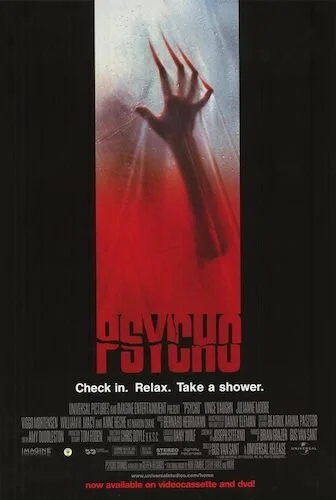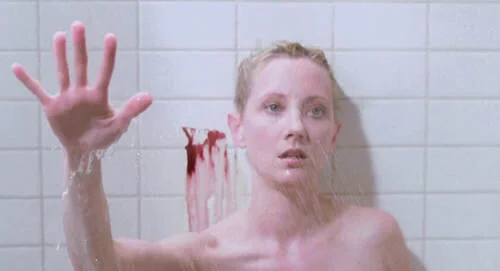Psycho (1998): 31 Days of Horror
For all of October, we will review horror films. Submit your requests here, and you may see your picks selected!
So we’ve been asked to review Psycho. Not even Alfred Hitchcock’s Psycho (which we have had requests for as well, and will get to), but Gus Van Sant’s reviled remake. I guess people really want to know more about this neglected experiment more than the classic that everyone has discussed for sixty years. That’s fair, given that there might be a bit of a unique take on something as polarizing as Van Sant’s bold shot-for-shot project. In actuality, Psycho (of 1998) is vapid, mainly because it feels like a pain staking recreation of the original film in so many major ways (outside of the occasional risks, including surreal imagery, slightly more blood and nudity, and, obviously, lush colours). What gets lost in translation is life. Psycho comes off as the greatest high school recreation project for drama class, but it’s still of that caliber. Despite the big names involved, Psycho is pure regurgitation that stymies any talent.
You might hear about how so many remakes are redundant, and Psycho is a major reason why. You see how it does absolutely nothing to enhance, better, or deviate from the original iconic horror film. If anything, Van Sant’s Psycho doesn’t get daring enough, especially in 1998 when mainstream cinema was getting dangerous again, thanks to the likes of Tarantino and Rodriguez: if Hitchcock’s Psycho was a turning point for the New Hollywood movement, what’s Van Sant’s version really doing, especially at this threshold? However, as much of a figurehead for unnecessary remakes as Psycho is, I can’t help but find at least something noble about what Van Sant was doing. The end result is lousy. We’ve already discussed that. But the experiment itself is something very interesting. Van Sant could have made it entirely his own film, outside of the small changes he made. Why didn’t he?
Van Sant’s Psycho is lifeless, despite being heavily indebted to Hitchcock’s original in almost every way.
It’s as if Van Sant was prepared to fail with Psycho, because the statement of the production was louder than the end result. The Hollywood churning machine sucks life out of so many works, whether they are films of yesteryear being remade, or great new ideas run into the ground. In Hitchcock’s Psycho, we see the murdering of the Hollywood of old, as we venture forth to new pastures. In Van Sant’s Psycho, we’re watching the already decayed corpse of the Hollywood machine, slithering out into full view for one last gaze until it completely disintegrated into the soil below. That’s why I have some weird connection to Van Sant’s experiment. As a film, Psycho is rancid. As performance art, I can’t help but feel something with it.
I honestly think Van Sant’s Psycho will be reevaluated to some degree down the road, as it isn’t a masterpiece, but it is mightily intriguing. Van Sant himself has gone on to say that this was a failure of his, but I honestly wouldn’t go that far, despite the end result. Now, I’d go on record to say that any remakes of a similar nature (or meant to make money by name, as opposed to improve previous works) are completely unnecessary, especially in the shadow of Psycho; we don’t need to be shown the same results many times. Gus Van Sant is also a much nobler filmmaker than many that are guilty of this, considering he made Psycho because he loves cinema as art, and not as a business. Maybe that’s why I’m not repulsed by it. Nonetheless, we needn’t try this ever again.
Andreas Babiolakis has a Masters degree in Film and Photography Preservation and Collections Management from Ryerson University, as well as a Bachelors degree in Cinema Studies from York University. His favourite times of year are the Criterion Collection flash sales and the annual Toronto International Film Festival.






